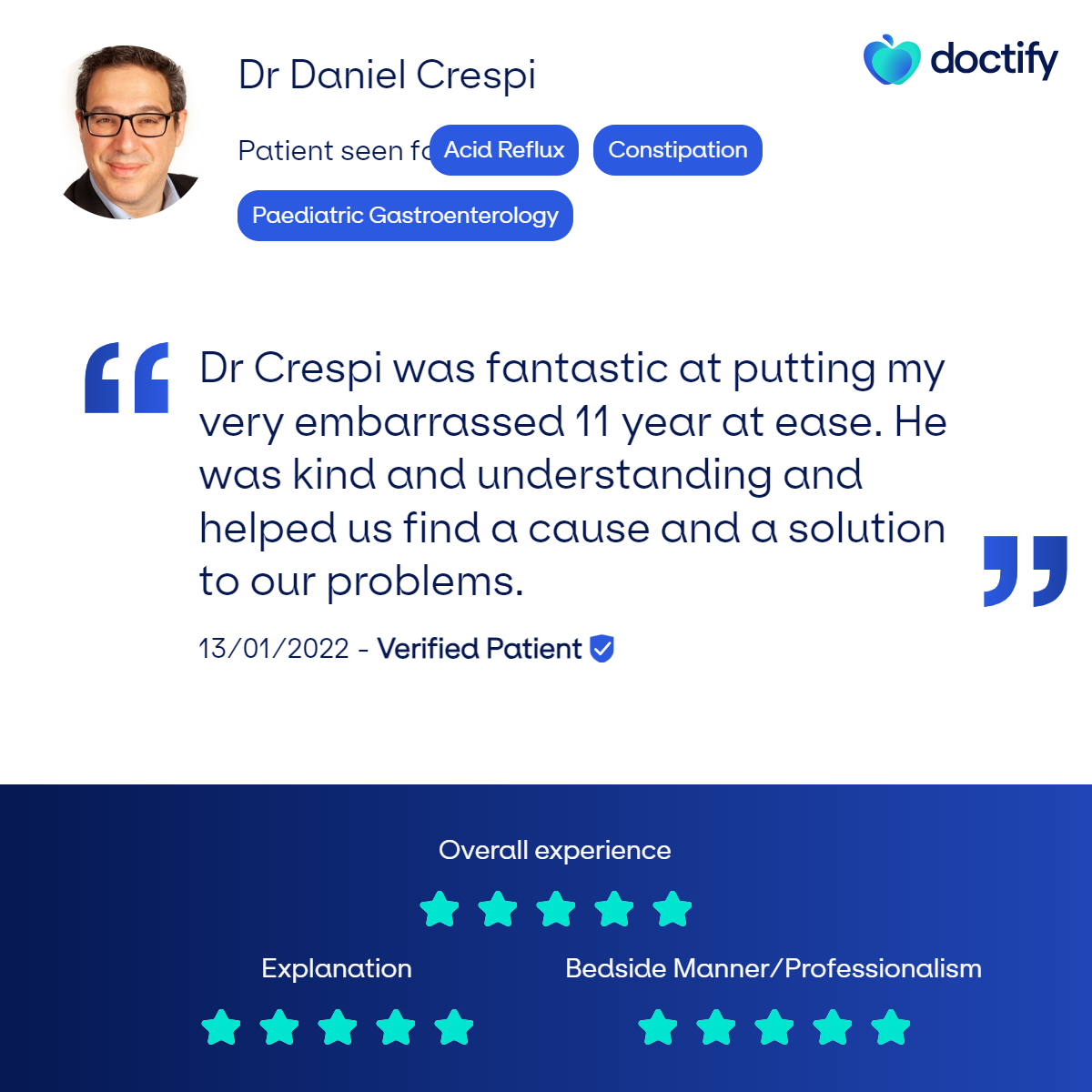Paediatric Gastroenterology Clinics with Dr Daniel Crespi Specialist help for tummy troubles in children of all ages from newborn to 18
Why see a Paediatric Gastroenterologist ?
Differences between paediatric and adult gastroenterology
Although there is a great amount of overlap between paediatric and adult gastroenterology, there are also significant differences between them.
There are a variety of symptoms and conditions that can affect the digestive system of both children and adults. Some occur only in adults, for example diverticulitis. Others occur more often in children eg allergic proctocolitis.
In my patients approaching the later teenage years, the symptoms and presentation may be similar to that of an adult. The approach to diagnosing and managing the illness can be similar.
However, there are always specific important elements to consider within a paediatric setting including the potential or actual impact on:
- school or college attendance and major exams
- the immediate and wider family
- progression through appropriate teenage development and puberty
- quality of life
- growth
For example, Ulcerative colitis, a type of chronic inflammatory bowel disease, can present in a very similar way to that in adults - blood seen in frequent loose stools i.e. bloody diarrhoea.
The management is almost identical to that in adults.
Crohn's disease, another form of chronic inflammatory bowel disease, is not so easily diagnosed if it is not considered. The symptoms can be more vague.
The methods used to diagnose it are similar to those used in adults.
Sometimes the treatment options are quite different in children compared to adults. The initial treatment for milder forms of Crohn's disease in children can be very different to that used in adults. Exclusive use of nutritional therapy is the major first line treatment for most children with mild Crohn's disease. It has the benefit of having a positive impact on symptoms and growth with little or no side effects.
Presenting symptoms vary in younger children
Younger children, in whom the underlying process causing the symptoms may be similar to that in adults, often come to medical attention in quite a different way. They can have less clear cut symptoms than in older children, but again the impact can be hugely significant placing great strain on a family.
A younger child may present with feeding difficulties for a variety of reasons.
This may sometimes be due to conditions affecting the food-pipe such as oesophagitis or inflammation of the food-pipe. Reflux of (often acidic) stomach contents into the food-pipe can cause oesophagitis.
Sometimes an allergic type of inflammation, known as Eosinophilic oesophagitis, may affect the food-pipe. How this comes to attention varies greatly with the age of the child.
Some children I have seen, have had a one-off distressing experience or a series of repeat unpleasant experiences that has then led to a dramatic impact on their digestive health.
Often children who have had such issues may develop food aversion, or dramatically restrict their food intake, because of the association with discomfort. Meal times can become a source of stress and in some ways a battle of wills.
An older child with the same condition may have very different symptoms, but will usually be able to express themselves more easily, and explain things more clearly.
For example they can more precisely explain how their swallowing is affected, occasionally with a feeling of food becoming stuck during swallowing, chest discomfort or heartburn.
In some children with special needs, verbal expression of their feelings or experience is not always possible. Parents may recognise a change in behaviour from the norm that alerts them to there being a problem.
Similarly to feeding issues, a painful experience whilst opening bowels in the early years can trigger off a pattern of behaviour such as stool withholding, that leads to significant constipation related problems.
The Gut-brain axis
Another hugely important area that I always consider is the interaction between our guts and our brains. The two systems are hard-wired together and constantly in communication. The so called disorders of gut-brain interaction (formerly the functional gut disorders) make up a huge proportion of the conditions seen in both adult and paediatric gastroenterology clinics. They include the Irritable bowel syndrome (IBS), dyspepsia, and abdominal migraine. The impact of social, environmental and psychological factors must always be considered as their influence can be substantial.
Again the way that children present with these conditions can vary with age. Symptoms can be present in those with other already established diagnoses such as Coeliac disease or inflammatory bowel disease.
It is important to recognise the possibility of these disorders of the gut-brain axis (previously known as functional gut disorders). Important so as not to over investigate or over treat them, exacerbating the situation with more stressful tests or potential for side effects.
Impact on Growth
In all children, illness can have an unwanted effect on growth by slowing it down or even stopping development of puberty for example. This always needs to be considered whilst managing a chronic condition. Not only can the illness itself have an impact on growth, but some of the treatments used can have a negative effect as well.
Paediatric gastroenterologists are very used to monitoring growth, one of the fundamental aspects of childhood that distinguishes it from adult medicine.
In younger children attending appointments I would ask if you could please bring along your child's Red book, with their weight and other growth measurements, when coming to see me.
Careful selection of diagnostic tests used in paediatric gastroenterology
To build up a clearer picture of what is causing your child's problems I may recommend carefully chosen investigations including:
- blood tests
- stool tests
- imaging tests such as x-ray, ultrasound or MRI
- Hydrogen breath tests
- endoscopy
There is again some overlap between how these tests are used in adult and paediatric gastroenterology patients but there are also important differences to consider as well.
A simple example is considering the ability of a child to tolerate or co-operate with certain tests.
For instance, an ultrasound of the tummy is much more acceptable to younger children than the more scary looking and noisy MRI scanner is.
Another difference is the use of a general anaesthetic during endoscopic procedures for children.
For more information about this see here.
Clinical Guideline differences between Children and Adults
Within medicine as a whole there is an abundance of national guidance on how to diagnose and manage a wide variety of conditions.
As a specialist in the area of paediatric gastroenterology, I keep up to date with the latest developments in diagnosing and managing children's digestive health conditions. With new knowledge from research and clinical trials constantly coming along, diagnostic and management guidelines are updated and changed to take account of the latest evidence.
For example:
The diagnostic pathway for Coeliac disease in children has undergone major change over the last few years and again in the last few months.
The latest guidance has been published just recently. There is now more of an opportunity to make the diagnosis without a need for an endoscopy and biopsy. I have gone into a lot more detail about this in a post within the Much Ado About Poo blog and you can read more here.
Inflammatory bowel disease guidance for adults (including patients aged 16 and over) has been published in December 2019. For more on this see my Facebook post here. There is some degree of overlap in care pathways and management between the older patients I see in a paediatric gastroenterology clinic, the 16-18 year olds, and those seen by adult gastroenterologists. It is essential to be familiar with these adult guidelines as well.
A great deal of emphasis is placed on what is reported by parents or other family members as being of concern, but I will always, as much as is possible, try to find out directly from your child what their experience has been. I may use diagrams or poo charts to help.
So I hope that you can see from this, that the approach to gathering information has to be tailored to the age of the child, their level of understanding and ability to explain how they are affected, as well as their tolerance of different available tests.
Contact the Kids Gastro Care team
COVID-19 Update
The COVID-19 pandemic has had a huge impact on all of us.
Visits to outpatient clinics or hospital, and most endoscopy procedures, have been severely restricted to urgent and emergency cases only. I am glad to say that some paediatric gastroenterology clinics (Elstree and Golders Green) are now open again for face to face visits.
To help you and your child at this difficult time, I now also have
Don't hesitate to be in touch on 07956550446
to discuss this with me as a possibility. If the clinical situation allows for this, I will do my best to help you this way.
Please stay at home and stay safe!
Dr Crespi


